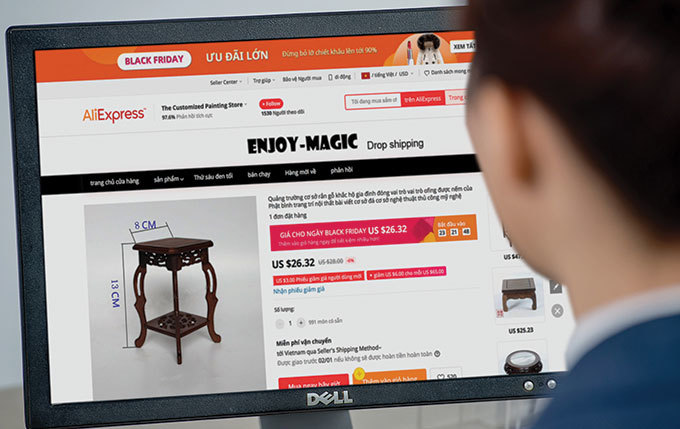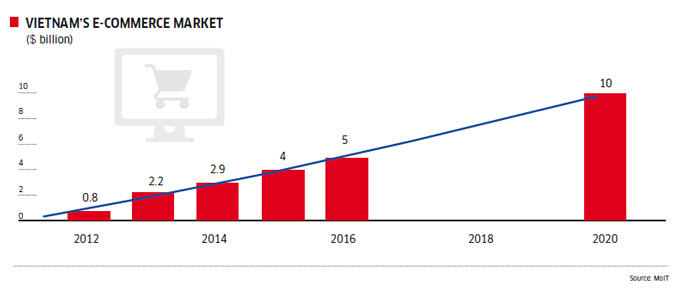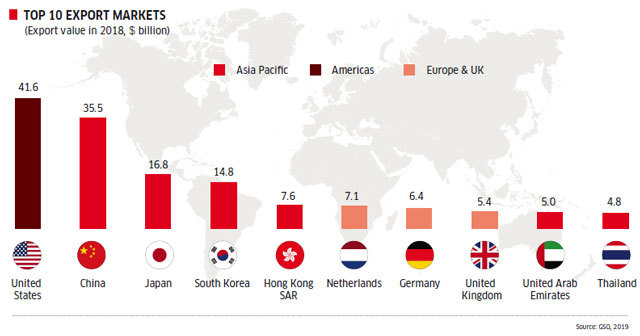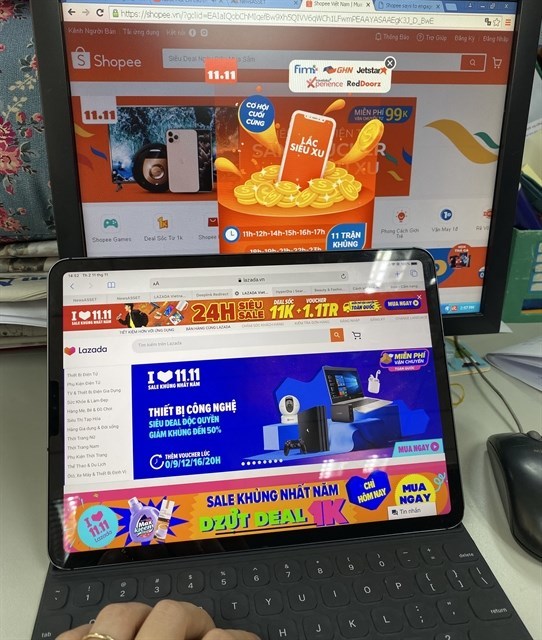 |
The Vietnam Agarwood Center, one of the leading local agarwood manufacturers and suppliers, has sent its products and materials to over 40 countries and territories around the world since seeking out e-commerce platforms a few years ago.
Alibaba.com has become its major export channel, receiving some 100 inquiries a month, 60-70 per cent of which become orders. “Vietnamese small and medium-sized enterprises (SMEs) have strong manufacturing capabilities, while e-commerce is actually lowering barriers for the country’s more than half a million entrepreneurs to take part in global trade,” said Mr. Zhang Kuo, General Manager of Alibaba.com.
Reaching the world
 |
Joining business-to-business (B2B) e-commerce platforms has helped many local exporters directly approach customers and seize opportunities in the global market while saving on traditional trade promotions.
“Online exporting has become the fastest way for businesses to procure orders quickly as e-commerce in the country has boomed in recent years,” said Mr. Pham Tan Dat, CEO of Miczone, the operator of cross-border trading platform Fado.vn.
“In the past, many businesses traditionally encountered cumbersome procedures and huge outlays of 15-30 per cent when seeking foreign partners or implementing trade promotion programs.”
M.i.i.n, an artificial eyelash manufacturer, also inspired other businesses with how its owner, Ms. Tran Bao Ngoc, saved her business from the brink within two weeks of working with Alibaba.com and is now receiving consistent large monthly orders from markets like the US and Russia.
Similarly, Mr. Vu Trung Son, Director of the Vietnam Agarwood Center, said 90 per cent of its customer portfolio now comes from Alibaba.com.
After officially setting up base in the country a few months ago, Amazon Global Selling Vietnam (AGSV), Alibaba.com’s largest competitor, has also been enabling local SMEs to expand their business to international markets.
The two giants have both committed to supporting SMEs by providing effective sales solutions on e-commerce platforms, like how to develop brands, find potential customers, and manage their online stores.
Vietnam has inherent advantages in manufacturing, especially in the fields of textiles, leather, shoes, and consumer products. “Together with local partners, AGSV will help businesses identify and seize opportunities to export domestic products, diversify global product lists, and contribute to the growth of Vietnam’s economy,” said Mr. Tran Xuan Thuy, AGSV Director.
“We have seen many succeed after launching or extending their business on Amazon, and the AGSV team will help them reach a wider marketplace, explore export opportunities, and receive educational support regarding professional cross-border e-commerce and operational skill sets.”
Among the many success stories of local small and medium-sized enterprises (SMEs) that transformed their businesses via e-commerce are Paper Color, Mary Craft, and Babu Handmade. Selling globally helps all reach out to a huge number of customers around the world, while saving on sales and marketing costs.
“We learned how to operate the business professionally based on customer feedback,” said Ms. Le Thi Thien Ngan, Founder and CEO of greeting card supplier Paper Color.
“We now export to more than 30 countries and territories and are continuing to grow our own branding. If the number of your customers purchasing via Amazon is growing you will also have more opportunities to sell your products to millions of other customers.”
Mary Craft’s sales, meanwhile, have grown by more than 150 per cent each year since it started selling on Amazon in 2015.
“Amazon helps me reach a wider global market,” said Founder and CEO Ms. Mary Nguyen. “In particular, Fulfillment by Amazon (FBA) helps me meet orders from Amazon and other sales channels. FBA assists us in shipping products to customers within one or two days, which is great for business.”
Opportunities ahead
 |
Cross-border trade is growing strongly and together with traditional exports plays an important role in Vietnam’s international trade, according to data from the Ministry of Industry and Trade. Exports increased 2.51 times, from $96.91 billion in 2011 to $243.48 billion in 2018.
The Vietnam E-commerce Association (Vecom) has also noted that 32 per cent of all local SMEs have established business relationships with foreign partners through e-commerce channels.
Mr. Dat from Fado.vn said cross-border trade is still to catch up with the pace of the larger e-commerce sector in Vietnam, which grew at an astounding 35 per cent, but he believes it will see high growth in the time to come.
Underpinning this, authorities have been working on a legal framework for e-commerce and cross-border trade, and information and technology infrastructure and cross-border platforms in Vietnam measure up quite favorably against regional countries.
Moreover, Vietnam currently ranks fourth among the Top 10 countries globally with the largest number of suppliers on Alibaba.com, according to Mr. Tran Dinh Toan, Deputy CEO of OSB Holding, a local partner of Alibaba.com.
He also said exporting via e-commerce platforms brings economic efficiency and is suitable to the potential Vietnam’s SMEs possess. Looking to the future, Mr. Kuo from Alibaba.com told VET that it targets to work with 10,000 enterprises in Vietnam within the next five years.
“We have seen great potential in Vietnam as there are a large number of SMEs and they are boosting exports and moving into e-commerce,” said Mr. Thuy from AGSV.
“We also see some individuals looking to earn a second income from an online business. Feedback on Vietnamese products from global customers has been positive because of their high quality and reasonable prices.”
In view of the huge growth potential of Vietnamese vendors, AGSV expects momentum will continue into the future. “Vietnamese enterprises are well known for their manufacturing capabilities and Vietnam has a lot of young talent and strong online communities,” he went on.
“These are essential drivers helping manufacturers market and sell their products successfully on Amazon. We have seen many interesting stories in Vietnam over the last few years.”
Cross-border barriers
Along with Vietnam’s strengths are also weaknesses, especially at SMEs, such as a lack of human resources support and technology, especially e-commerce and exporting tools, according to AGSV. Many also lack knowledge about cross border e-commerce and this is a focus for the Amazon company.
It plans to strengthen existing cooperative efforts with local partners such as the Vietnam Trade Promotion Agency (Vietrade), Vecom, local online communities, and service providers.
“At the same time, we will explore and establish new partnerships with more local partners to provide a comprehensive ecosystem, from finance, payment, logistics, and account management to brand registry, to make it easier for local vendor partners to grow their business globally with Amazon,” Mr. Thuy said.
Mr. Nguyen Ngoc Dung, Vice Chairman of Vecom, said local enterprises still have limitations in information and knowledge about e-commerce, especially cross-border trade, leading to difficulties and inefficiencies in online exports.
Online is yet to be common because businesses don’t have the skills to confidently sell their products via such channels. The Association has worked with many providers and consulting companies to support businesses in accessing websites to export products.
There are also certain barriers in global trade that are challenges, such as fraud and trade disputes, according to Ms. Toan from OSB.
Transactions are conducted without face-to-face meetings, so if a business is not familiar with the online environment or equipped with the necessary skills and international trade experience, there are certain implicit risks it must tackle.
He recommended the government complete the legal framework for e-commerce and introduce a comprehensive system of regulatory documents, focusing on promoting the application of e-commerce in key export industries in order to enhance market access and further expand scale, as well as building and developing an e-commerce payment system.
There should also be more practical support for Vietnamese exporters to join cross-border e-commerce trading platforms, which would improve their competitiveness internationally. VN Economic Times
Hong Nhung

E-commerce: an inevitable integration trend
The application of new technologies - artificial intelligence, big data, cloud computing and Internet of Things - is taking place across the globe.

Year-end promotions heat up Vietnam's e-commerce market
The year-end online shopping frenzy has kicked off with giant local and foreign players like Lazada, Tiki, Sendo, and Shopee rolling out promotions since the middle of last month.
 Many local SMEs have seen exports surge after teaming up with global e-commerce platforms.
Many local SMEs have seen exports surge after teaming up with global e-commerce platforms.